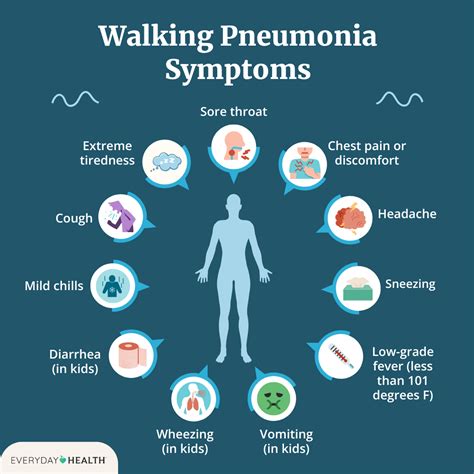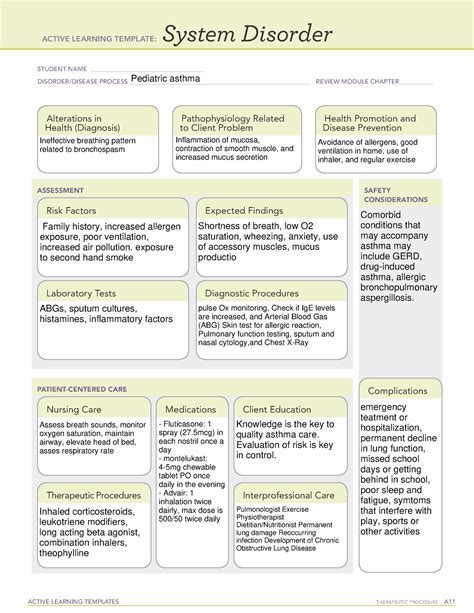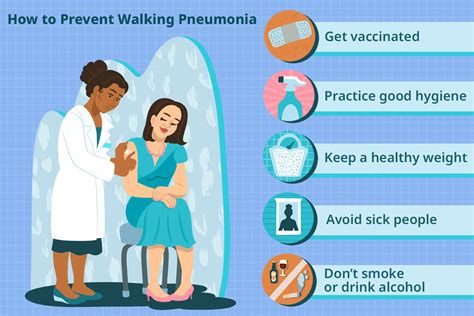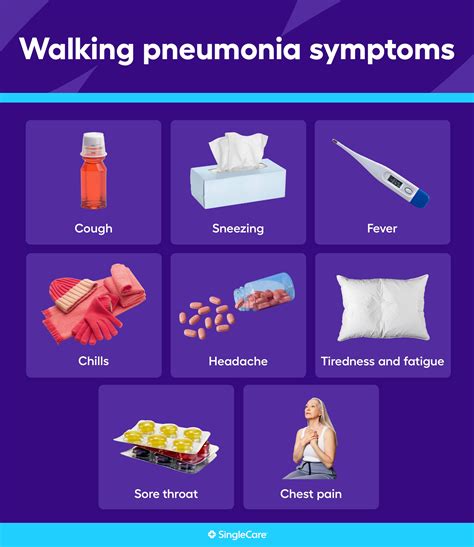Intro
Discover effective walking pneumonia treatment options, including antibiotics, home remedies, and symptom relief methods, to manage mild pneumonia and prevent complications, promoting speedy recovery and overall respiratory health.
Walking pneumonia, also known as atypical pneumonia, is a mild form of pneumonia that can be caused by various bacteria, viruses, or other microorganisms. It is called "walking" pneumonia because its symptoms are often mild enough that one can still be walking around rather than being bedridden. Despite its mild nature, walking pneumonia can still cause significant discomfort and requires proper treatment to prevent complications and promote recovery.
The importance of seeking medical attention for walking pneumonia cannot be overstated. While the symptoms may seem manageable, the infection can progress and lead to more severe conditions if left untreated. Furthermore, some individuals, such as the elderly, young children, and those with compromised immune systems, are at a higher risk of developing severe pneumonia. Therefore, understanding the treatment options available for walking pneumonia is crucial for effective management and prevention of potential complications.
Walking pneumonia treatment options are varied and depend on the underlying cause of the infection, as well as the severity of symptoms and the individual's overall health. In general, treatment aims to alleviate symptoms, combat the underlying infection, and prevent complications. The choice of treatment may involve a combination of medications, lifestyle modifications, and supportive care. By exploring the different treatment options available, individuals can better understand how to manage walking pneumonia and regain their health.
Understanding Walking Pneumonia

To develop an effective treatment plan for walking pneumonia, it is essential to understand the condition itself. Walking pneumonia is typically caused by the Mycoplasma pneumoniae bacterium, although other microorganisms like Chlamydophila pneumoniae, Legionella pneumophila, and influenza virus can also be responsible. The infection is usually spread through respiratory droplets, such as those produced by coughing or sneezing, or by touching contaminated surfaces and then touching one's face. Symptoms of walking pneumonia can include mild fever, cough, sore throat, headache, and fatigue, and may resemble those of a common cold or flu.
Causes and Risk Factors
The causes of walking pneumonia are multifaceted and can involve various bacteria, viruses, or other microorganisms. Certain risk factors, such as age, compromised immune system, and exposure to infected individuals, can increase one's likelihood of developing walking pneumonia. Understanding these causes and risk factors is vital for preventing the spread of infection and managing symptoms effectively.Treatment Options for Walking Pneumonia

Treatment for walking pneumonia typically involves a combination of medications, lifestyle modifications, and supportive care. Antibiotics, such as azithromycin or doxycycline, are commonly prescribed to combat bacterial infections, while antiviral medications may be used for viral causes. Over-the-counter medications, like acetaminophen or ibuprofen, can help alleviate symptoms such as fever, headache, and body aches. Additionally, getting plenty of rest, staying hydrated, and using a humidifier to relieve cough and congestion can also aid in recovery.
Medications for Walking Pneumonia
The medications used to treat walking pneumonia depend on the underlying cause of the infection. For bacterial infections, antibiotics are the primary treatment, while antiviral medications are used for viral causes. It is essential to complete the full course of medication as prescribed by a healthcare provider to ensure effective treatment and prevent the development of antibiotic-resistant bacteria.Lifestyle Modifications for Managing Walking Pneumonia

In addition to medication, lifestyle modifications play a crucial role in managing walking pneumonia. Getting plenty of rest, staying hydrated, and avoiding irritants such as smoke and dust can help alleviate symptoms and promote recovery. A healthy diet rich in fruits, vegetables, and whole grains can also support the immune system and aid in fighting off the infection.
Supportive Care for Walking Pneumonia
Supportive care, such as using a humidifier to relieve cough and congestion, can also aid in managing symptoms of walking pneumonia. Practicing good hygiene, such as washing hands frequently and avoiding close contact with others, can help prevent the spread of infection. By combining medication with lifestyle modifications and supportive care, individuals can effectively manage walking pneumonia and promote recovery.Preventing Walking Pneumonia

Preventing walking pneumonia involves taking steps to avoid exposure to the underlying causes of the infection. Practicing good hygiene, such as washing hands frequently and avoiding close contact with others, can help prevent the spread of infection. Additionally, getting vaccinated against flu and pneumococcal disease can also reduce the risk of developing walking pneumonia.
Vaccination and Walking Pneumonia
Vaccination plays a crucial role in preventing walking pneumonia, particularly among high-risk individuals such as the elderly and young children. The flu vaccine and pneumococcal conjugate vaccine can help protect against the underlying causes of walking pneumonia, reducing the risk of infection and promoting overall health.Complications of Walking Pneumonia

While walking pneumonia is generally a mild condition, it can lead to complications if left untreated or if the individual has underlying health conditions. Complications can include respiratory failure, sepsis, and meningitis, which can be life-threatening if not promptly treated. Therefore, it is essential to seek medical attention if symptoms persist or worsen over time.
Seeking Medical Attention
Seeking medical attention is crucial for effective management and prevention of complications associated with walking pneumonia. A healthcare provider can diagnose the condition, prescribe appropriate treatment, and monitor the individual's progress to ensure recovery.Conclusion and Next Steps

In conclusion, walking pneumonia is a mild form of pneumonia that requires proper treatment to prevent complications and promote recovery. By understanding the treatment options available, including medications, lifestyle modifications, and supportive care, individuals can effectively manage walking pneumonia and regain their health. It is essential to seek medical attention if symptoms persist or worsen over time and to take steps to prevent the spread of infection.
We invite you to share your thoughts and experiences with walking pneumonia in the comments below. If you have any questions or concerns, please do not hesitate to reach out. Additionally, if you found this article informative and helpful, please share it with others who may benefit from this information.
What are the symptoms of walking pneumonia?
+The symptoms of walking pneumonia can include mild fever, cough, sore throat, headache, and fatigue, and may resemble those of a common cold or flu.
How is walking pneumonia treated?
+Treatment for walking pneumonia typically involves a combination of medications, lifestyle modifications, and supportive care, including antibiotics, over-the-counter medications, rest, hydration, and humidification.
Can walking pneumonia be prevented?
+Yes, walking pneumonia can be prevented by practicing good hygiene, such as washing hands frequently and avoiding close contact with others, and getting vaccinated against flu and pneumococcal disease.
What are the complications of walking pneumonia?
+Complications of walking pneumonia can include respiratory failure, sepsis, and meningitis, which can be life-threatening if not promptly treated.
When should I seek medical attention for walking pneumonia?
+You should seek medical attention if symptoms persist or worsen over time, or if you experience difficulty breathing, chest pain, or severe headache.
